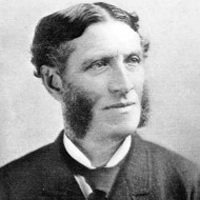Matthew Arnold - Biography and Works
Matthew Arnold (1822-1888) is a Victorian poet. He was also a great critic of his age. His voice is a true voice of the sensitive Victorian intellectual lamenting ever inevitable (something that can’t be stopped) loss of faith and the meaning of life.

Matthew Arnold
He taught poetry at Oxford from 1877 and published Culture and Anarchy (1869) and Essays in Criticism: Second Series (1888). Arnold wrote poetry in the 1850s, literary and social criticism in the 1860s, religious and educational writings in the 1870s, and a second set of essays in literary criticism in the 1880s. Oxford inspired some of Arnold’s best poems like Thyrsis and The Scholar Gipsy. Among his other poetical works may be mentioned Sohrab and Rustum, Dover Beach and Forsaken Merman. Arnold was also a perceptive critic and his major critical writings are contained in the two series Essay in Criticism.
Arnold was the third of the major poets of the Victorian Era. He had, as he himself said, “less poetical sentiment than Tennyson”. Yet he represented one phase of Victorian life and thought. While Tennyson sang about the hopes and fears of the age, and Browning asserted its faith and optimism, Arnold expressed its pessimism and melancholy. He was destined to live in an age out of tune with his genius. Caught between two worlds, he could not put his faith in either. That was Arnold’s problem. So the dominant note in much of his poetry is a brooding melancholy.
His poems are the products of fastidious workmanship and they abound in exquisite vignettes of nature and rhythmic felicities. As the poet of a deep spiritual schism that still remains with us, Arnold is nearer to us than either Tennyson or Browning. He himself has said, is the fusion of poetical sentiment and intellectual vigor. This is what he has to say of his own poetry: “My poems represent, on the whole, the main movement of mind of the last quarter of a century, and thus they will probably have their day as people become conscious to them of what the movement of mind is, and interested in the literary production which reflect it. It might be fairly urged that I have less poetical sentiment than Tennyson, and less intellectual vigor and abundance than Browning; yet, because I have perhaps more of a fusion of the two than either of them, and have more regularly applied that fusion to the main line of modern development, I am likely enough to have my turn, as they have had their”.
